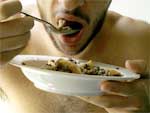Emotional Eating
 Does food serve as a distraction from uncomfortable moments in your life? If so, emotional eating may be your way of avoiding emotional discomfort. A focus on food diverts our attention from anything we’d rather not think about.
Does food serve as a distraction from uncomfortable moments in your life? If so, emotional eating may be your way of avoiding emotional discomfort. A focus on food diverts our attention from anything we’d rather not think about.
Characteristics of emotional eaters
- Serious emotional eaters obsess about food
- Emotional eaters rely on food as their primary means to self-soothe
- For an emotional eater, somewhere along the way, food became the No. 1 means of entertainment and distraction
- Emotional eaters feel distress over their relationship with food. They often describe their eating as compulsive eating or food addiction, and they don’t know what to do to stop!
Emotional Eating is not about food; it is a coping tool for handling life. Eaters Disorders Anonymous explains:
“Many of us were deeply negative and unable to distinguish negative thought patterns from reality; our perspective was distorted. Most of us were caretakers who were out of touch with our own needs. Because our needs went unmet, we were deeply resentful. In recovery, we learn to recognize our needs and take responsibility for getting them met. This raises our self-esteem.”
Eating Disorders Anonymous suggests links disordered eating to stress, and encourages members in ways to relieve stress more healthily. The acronym HALT is a common shorthand reminder to recognize when one is Hungry, Angry, Lonely, or Tired, and to do something positive to relieve the stress.
 Eating Disorder Self Test. Take the EAT-26 self test to see if you might have eating disorder symptoms that might require professional evaluation. All answers are confidential.
Eating Disorder Self Test. Take the EAT-26 self test to see if you might have eating disorder symptoms that might require professional evaluation. All answers are confidential.